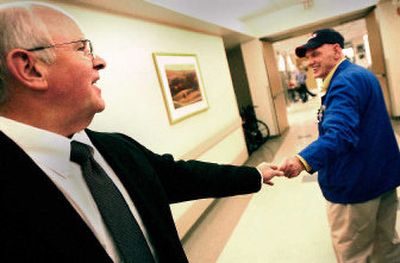VA hospital director retires

Joe Manley, a Vietnam veteran who spent a dozen years as director of the Veterans Affairs Medical Center in Spokane, retired Wednesday, capping a period of rapid growth and striking change.
Manley, 59, headed the center that last year served some 23,000 veterans from three states. His tenure included a full-scale remodeling of the Assembly Street site, the introduction of advanced technology and equipment – including the region’s first electronic medical records – and a 130 percent increase in clients.
And, Manley said, his successor should expect more of the same. By 2012, the number of veterans the hospital serves is projected to jump 43.5 percent, to 33,000 vets a year.
“I think with the growth of the veteran population, there will be an increasing need for health care services,” Manley said. “The challenge will be: Can they expand the hospitals to keep up with the need?”
As he left, Manley revealed preliminary plans that would provide improved access for veterans across the Inland Northwest. They include a tentative proposal for a $5 million outpatient clinic in North Idaho and a $7 million expansion of specialty clinics and pharmacy services in Spokane.
“We’re optimistic,” said Manley, who spent part of Wednesday saying goodbye to many of the 650 employees at the northwest Spokane hospital.
A new VA clinic is set to open in Wenatchee in April.
Tentative plans for a similar facility in North Idaho call for a 10,000- to 20,000-square-foot clinic on the Highway 95 corridor between Coeur d’Alene and Sandpoint, said Jane Schilke, the hospital’s associate director. The clinic would include a staff of about six doctors, nurses and counselors and serve an estimated 6,000 to 7,000 patients who now travel to Spokane.
The main hospital expansion would provide more examination rooms and space for the pharmacy, which last year filled more than 600,000 prescriptions, Manley said.
Talk of expanded services seems at odds with funding cuts that VA officials said forced them to curtail 24-hour service at the hospital’s urgent care center last summer, leading to controversy over at least one veteran’s death.
But Schilke said the funds are being directed to areas of greatest need.
“None of those expansions involve inpatient care or expansion of care that requires 24-hour services,” she said.
Schilke will supervise daily operations at the hospital until a new director is chosen by the Secretary of Veterans Affairs, probably by June. Six finalists are being considered for the job, which paid Manley $156,000 a year.
Manley, a West Virginia native, is an Army veteran of the Vietnam War who enlisted at age 18, left active duty as a 22-year-old captain, and retired from the Army Reserves in 1997 as a colonel.
He spent 30 years working for the VA, including jobs as associate director at medical centers in Seattle, North Carolina and West Virginia. Manley also held senior management posts at the agency’s national headquarters and was named a fellow of the American College of Health Care Executives.
He’s retiring now to spend more time with family.
“I’m excited; my family and I are looking forward to it,” Manley said.
Area veterans’ groups gave Manley good marks, saying he was a strong advocate during a difficult time.
“With the bureaucracy of the VA, he’s tried to do pretty much everything he can do to get advanced benefits for us,” said Mike Foth, a commander with a Spokane unit of the Veterans of Foreign Wars.
Some veterans wished Manley had done more for pet projects, such as establishment of a local veterans’ cemetery.
And the new director should be prepared to fight for increased staff so vets won’t have to travel so far for service, said Lyle Carstens, 8th District Commander of the American Legion.
“I think Mr. Manley has done a really stellar job for what he had to work with,” said Carstens. “It’s got to be one of the most thankless jobs in the world.”